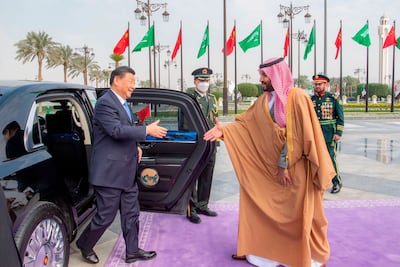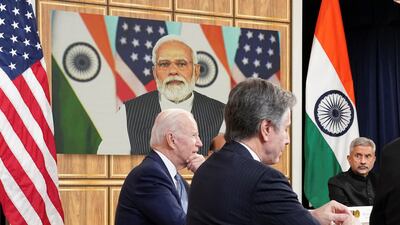The “swing state” has been the hallmark of American politics since at least the turn of the century and the “hanging chads” debacle in Florida during the 2000 presidential election.
Now the US merchant bank Goldman Sachs has produced a note suggesting that the most important driver of geopolitics should be the recognisable swing countries that are either non-aligned vis-a-vis the traditional powers and power blocs, or are willing to set their own course. A write-up issued last week explained why this insight should be important to its clients in just a few words: “In the 2020s, everything is geopolitical.”
It describes the countries best placed as relatively stable states with their own global agendas and possessed of the will and capabilities to turn those priorities into reality. These swing states are more assertive and use their economic advantages to bolster their standing and influence. Consequently, their governments are more demanding, flexible, dynamic and strategic in pursuing their self-interest than they could have been in the 20th century, according to the Goldman Sachs thinking.
What kind of state are the researchers seeing?
There are four categories of state (many of which have overlapping characteristics): “Countries with a competitive advantage in a critical aspect of global supply chains; countries uniquely suited for nearshoring, offshoring, or friendshoring; countries with a disproportionate amount of capital and willingness to deploy it around the world; countries with developed economies and leaders with global visions that they pursue within certain constraints.”
For an insight into the type of thinking that typifies a more independent stance, the paper cites the comments by Indian External Affairs Minister Subrahmanyam Jaishankar after the full-scale invasion of Ukraine last year. “Europe has to grow out of the mindset that Europe’s problems are the world’s problems but the world’s problems are not Europe’s,” Mr Jaishankar said.

In a commentary for the think tank Rusi, Andrew E Yaw Tchie wrote of the uniformly negative reporting on Rwanda’s pact with the UK to take deported asylum seekers. He wrote the slant was always that Rwanda was doing the UK’s “dirty work”. In fact, Rwanda is a willing partner and a country with its own policy choices.
It follows that strategic strengths possessed by some nations represent opportunities for the established western countries and their counterparts. For example, Morocco has 70 per cent of the world’s phosphate reserves. Or, for the investor, there is the prospect that Indonesia will become more of a manufacturing nation since it has 22 per cent of the planet’s nickel reserve.
Goldman Sachs adds that the Gulf Co-operation Council nations are reintroducing themselves to the world as productive partners. Vietnam last year surpassed the UK as the seventh-biggest trade partner of the US.
The architecture of global alliances is already reforming to take account of these realities. It is possible to point at diplomacy or defence platforms, such as the Quad, which includes Australia, India, Japan and the US. This set of states has also set up the Critical and Emerging Technologies working group. Another example is Aukus, the Australian, UK and US alliance.
Then there are Japan, South Korea, Taiwan and the US in the so-called Chip 4. We can also cite Japan’s model of Data Free Flow with Trust, or the decision by Nato to open a liaison office in Tokyo.
One of the incentives for Beijing to help orchestrate the rapprochement between Iran and Saudi Arabia was not its own immediate self-interest but a longer-term view that a transforming capital, such as Riyadh, will have greater relevance to Beijing in the future.

For every initiative such as the New Mineral Partnership, there is also a dilemma for the western states or those who deal with them. Take, for example, the US subsidies for a green economy and semi-conductors. These have stipulations for domestic production or local content that the World Trade Organisation rules restrict. At least two-thirds of world trade is still based on WTO rules, but there is no realistic comeback through the body to redress the US policies.
It is a similar story when Europe rolls out its flagship Carbon Border Adjustment Mechanism (CBAM). India has called this measure, which applies higher tariffs on carbon-intensive imports, behind-the-border protectionism. Southern African countries say the effect on their trade with Europe is likely to be chilling. Europe can point to an over-riding imperative of the climate challenge in pushing on with CBAM in the teeth of such opposition. But other policies now risk burning its bridges with pivotal states yet further.
When French President Emmanuel Macron wants to suspend aspects of laws designed to lower greenhouse gases so that a new Made in Europe policy can be adopted, he is doing so in parallel with CBAM going into force. The idea that co-operation and co-ordination with other states should be foremost is then chucked out in the most important instances. It does not help when Josep Borrell, the EU’s foreign affairs commissioner, compared Europe to a garden and the rest of the world as a jungle. For good measure, he added “the jungle could invade the garden”.
Goldman Sachs says that geopolitics doesn’t just matter to a clutch of high-profile sectors but to all economic opportunities. The swing states research is a reminder that global success means navigating alongside pivotal players that are happy to assert their interests above all else.


